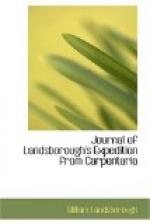February 13.
Number 3, our last camp, was situated on the right bank of a shallow watercourse. As one of the horses had barely recovered the effects of travelling on stony country when on the expedition to the south-west, we had this morning to put a shoe on one of his feet with screw nails; the screws, in the absence of proper nails, answer tolerably well. We started at 9.6 and, having passed over a rich, lightly-wooded plain about eight miles, we reached the Leichhardt River at a part where the tide reaches. This river seems to be fully larger than the Albert. The tracks of Walker’s party were so indistinct on the rich plains from so much rain having fallen that I gave up hope of being able to follow them. We coursed the river down three-quarters of a mile and found a shallow rocky ford, but it was not available as the rocks were too slippery and the opposite bank too steep. Near the ford we saw some articles belonging to the blacks, and amongst them a piece of an old blanket that I fancied was a part of one I had given to them at the Albert River. From the ford we returned up the river and encamped near some small waterholes. The direction we came today from last camp south-east by east; distance eight miles. In the distance I may be a little out of my calculation, my watch having stopped. This was particularly vexing as I had bought it expressly for keeping the time while on this expedition. After dark we heard the horses galloping and, as Jemmy, Jackey, and Fisherman thought blacks were driving them away, I sent them to fetch them back; but they did not disturb them as they were feeding quietly and no blacks were seen.
February 14.
We left Number 4 Camp this morning at 7.50. In following the river up about seven and three-quarter miles to a basaltic ford, where the water was fresh, we passed over rich well-grassed country, consisting chiefly of plains, separated from each other by low wooded country. On the low land we observed salt herbs, and pigweed, the proper name of which, I believe, is portulac. We crossed the ford and camped on the opposite side. The scenery here is picturesque; there is a fall of about thirty feet with beautiful trees in its neighbourhood. The channel of the river showed extensive old flood-marks and had plenty of water in it, but I had to make a minute examination of it before I discovered the water was running. In a fine deep hole below the fall Mr. Bourne and I intended bathing, but had to go further, from hearing something like a large animal plunge into the water. To the eastward I made an observation of the sun from a short plain horizon; I made the altitude 84 degrees 45 minutes, latitude 18 degrees 10 minutes 30 seconds. We came here on the following courses: 8.35 south-east for two miles; 8.45 south half a mile to boggy ground; 10.20 south half east three and a quarter miles; 10.35 south half a mile and crossed a shallow watercourse from the west; 10.50 east one mile and crossed another watercourse; 12.50 east half a mile and crossed the Leichhardt River.




